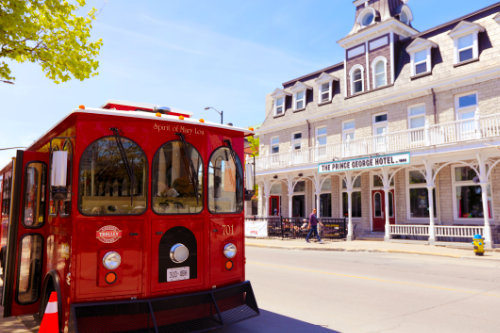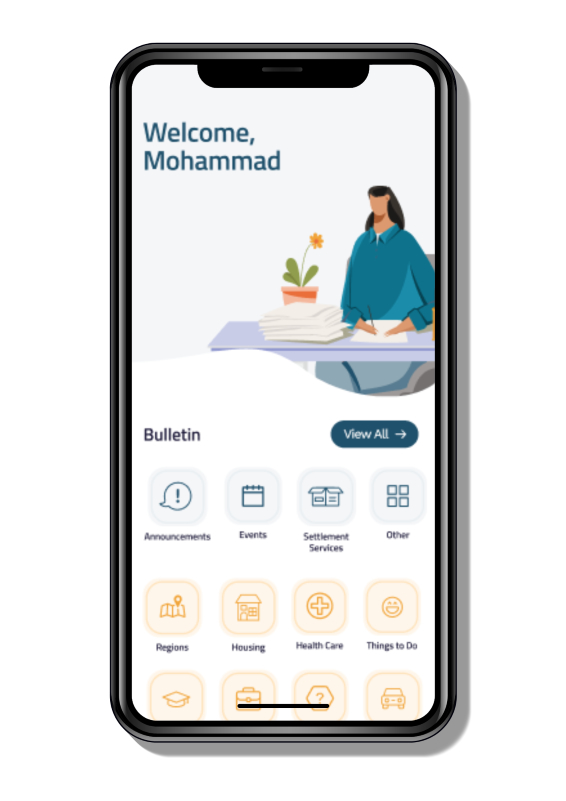
We’re so glad you've decided to come to Queen's School of English!
This guide provides useful information to help you before, during, and after your trip to Kingston, Ontario.
Let’s get started!
Queen's University is situated on traditional Anishinaabe and Haudenosaunee territory. To acknowledge this traditional territory is to recognize its longer history, one predating the establishment of the earliest European colonies. It is also to acknowledge this territory’s significance for the Indigenous Peoples who lived, and continue to live, upon it and whose practices and spiritualities were tied to the land and continue to develop in relationship to the territory and its other inhabitants today.

Queen's School of English partners with the Canada Homestay Network to provide you with an enriching and engaging experience. Homestay is recommended when you attend Queen's School of English. It is a safe, welcoming and immersive Canadian cultural environment where students are supported. All meals are provided.
Queen's School of English students prefer homestay for year-round programs and residence accommodations during the summer.
We strongly suggest students select accommodations through Canada Homestay Network (CHN). CHN supports students in a friendly home atmosphere, providing a private bedroom, utilities and three nutritious meals per day.
Student applications are due eight weeks before scheduled arrival
Homestay provides 3 meals per day. Typically, students will prepare their breakfast & lunch and the host prepares dinner.

Students are provided with a Kingston city bus pass as part of their QSoE fees.
Students placed with a CHN host have access to daily public transportation.
Travel time for students is guaranteed to be 45 minutes or less. This includes 1 or two buses and walking. Most students are placed in homes closer than a 45-minute commute.

The following information is indicative only. CHN sets their fees each year, and you should contact them to find the up-to-date costs for your stay.
Estimated fees are $45/night + $275 registration fee and a $75 administration fee per application.
This includes 3 meals per day, a private room, and the life-experience of gaining a new family!

Homestay provides 3 meals per day. Typically, students will prepare their breakfast & lunch and the host prepares dinner.

If Homestay is not an option for you, you may wish to investigate off-campus housing that you find yourself on websites or via social media. The Off-Campus Living page and Resource Package are excellent resources to consult.
Even when using well-known rental websites, please be careful of fraud. To protect yourself as a renter, never send money before you have had a chance to see the apartment yourself—either in person or through a live video call. If an apartment seems too good to be true (so convenient and so large for so low a price!), it probably is a fraudster trying to trick you into sending them money.
Please watch the video below where the Off-Campus Living Advisor (ocla@queensu.ca) outlines the timelines for your housing search, how to best navigate the Kingston rental market, budgeting, how to pick the best housemates, what to expect in a lease or a sublet arrangement, how to avoid housing/rental scams, and more.

Kingston is a vibrant city located by Lake Ontario, roughly halfway between the major cities of Toronto and Montreal, and just 150km south of Ottawa, the capital of Canada. Known for its historic charm and natural beauty, Kingston offers plenty of ways to enjoy both culture and the outdoors. Kingston is near several protected natural areas, making it easy to explore parks, trails, and waterfront spaces, while the city hosts frequent festivals and art exhibitions, including at Queen’s own Agnes Etherington Art Centre and Isabel Bader Centre for Performing Arts. Kingston is also one of the most historic small cities in Canada – in fact, it was the first capital of Canada – and it forms one end of the UNESCO world heritage site of the Rideau Canal.
Food lovers will also appreciate Kingston’s lively restaurant scene, which boasts one of the highest numbers of eateries per person in Canada. There are also a number of specialist food shops where you might be able to find a taste of home while you are here. Getting around is simple thanks to an efficient bus system, and intercity train and coach travel, and students can easily walk around the Queen’s campus and downtown.


The Welcome to Kingston app is a helpful guide for newcomers immigrating to Kingston, Ontario, Canada.
While it is legal to cross the street at any location in Canada, we recommend sticking to crosswalks. Most crosswalks will have a button to change the lights (after a short delay). We drive on the right in Canada, but look both ways, and be careful for drivers who may be turning on a red light (which is legal to do in Canada).
The centre of Kingston is pretty walkable, but there is network of city buses which can connect you to any part of town you may wish to visit. All QSoE students have free bus travel included with their student card. However, if you would like to travel by bus before you have your student card, payment can be made directly to the driver on board, or if you are going to take a few journeys, you can buy a multi-journey ticket or day/week pass from city hall. Fare information and schedules are available online, and the routes are completely integrated into Google Maps if you use their directions.
Driving in Ontario can be challenging for newcomers. Passing on either side of a car is not only legal, but encouraged, and it is legal (and necessary since there will be someone behind you beeping their horn) to turn right on a red light.
Special care should be given to yellow school buses as they can pull over at any time and are forbidden to pass on either side of an undivided road (no median strip) when they have their stop sign out.
Similarly, if you see an emergency vehicle driving with flashing lights, you are required to pull over and stop even if it’s on the other side of the (undivided) street.
It appears that no special documentation for driving or hiring a car other than a valid driving licence is required for trips of less than 3 months in Ontario.
Kingston has a variety of supermarkets, independent grocery shops and specialty stores. Generally speaking, prices are a little higher in shops in close proximity to the campus.
We know it can be tough when students move to Kingston to figure out where to buy groceries from home that might not be found in your average grocery store. Queen's asked students to share their tips on how to navigate this challenge and share some of their favourite shops and resources in Kingston.
Student discounts are available when you show your valid Queen's University student card at many grocery stores in Canada.
10% discounts on Tuesdays, Wednesdays, and Thursdays
10% back in PC Optimum points every Tuesday with the PC Optimum App
10% discount on Tuesdays
10% discount on Wednesdays
10% discounts on Tuesdays, Wednesdays, and Thursdays
Many international students say that the friendships they make at Queen’s enrich their experience and contribute to the creation of a well-rounded life at Queen’s. Meeting new people can feel like a bit of an effort when you first move to a new place but making friends can reduce the impact of cultural transition and ease you into academic life. It will also provide you with an invaluable support network in Kingston. Most Canadian students welcome the opportunity to meet new people and learn about other cultures, but you may find that you need to take the initiative.
At Queen’s School of English you will have the opportunity to extend your learning beyond the classroom. Participate in trips, activities, volunteer club and student council to make this experience your own. Immerse yourself in Canadian culture as you develop friendships, build community and create memories to last a lifetime.
Sample Activities Include:
QSoE students have the unique opportunity to give their time, knowledge and expertise to the Kingston community by joining the QSoE Volunteer Club. The club supports local charities and groups in need. Students decide how they can best support the charity, whether it be through fundraising activities, volunteering their time, or raising awareness in the community. Make a difference!

Over the years that QSoE has been welcoming students to Kingston, we have asked for recommendations of activities our students liked to do, restaurants they liked to eat at, and places they liked to go.
You can find some of their recommendations on the map below – and please remember to let us know of your favourites before you leave!

Queen’s School of English is proud to have its own full-time in-house advisor to help students.
If you need help understanding assignments; if you need help practicing English skills; if you need help finding information about Queen’s, Kingston, or the broader community; if you just need someone to talk to, please feel free to contact the QSoE Student Advisor on qsoeadvisor@queensu.ca.

Queen’s University International Centre (QUIC) provides help and support for all international students studying at Queen’s.
As well has having International Student Advisors, who are able to answer visa and study permit questions, they also have many events for international students to meet other community members, practice English and academic skills, and get to know what Queen’s and the Kingston community has to offer.
Student Academic Success Services (SASS) provides academic support for all Queen’s students, but also has resources aimed at the special challenges that those who use English as an Additional Language face.
From particular language skills like using reported speech, to more global life skills, such as time management, SASS has many workshops, online workbooks, and experts available to help.